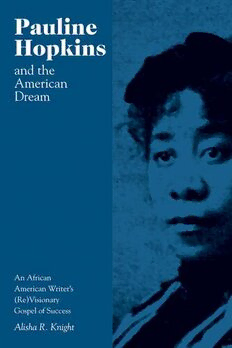
Pauline Hopkins and the American dream : an African American writer's (re)visionary gospel of success PDF
Preview Pauline Hopkins and the American dream : an African American writer's (re)visionary gospel of success
Pauline Hopkins and the American Dream Pauline Hopkins and the American Dream An African American Writer’s (Re)Visionary Gospel of Success Alisha R. Knight The University of Tennessee Press / Knoxville An earlier version of chapter 2 appeared as “Furnace Blasts for the Tuskegee Wizard” in Amer- ican Periodicals 17.1 (2007): 41–64, published by The Ohio State University Press. It is used here with the permission of the publisher. An earlier version of chapter 4 appeared as “‘All Things Work Together for Good’: Pauline Hopkins’s Race Woman and the Gospel of Success” in Loopholes and Retreats: African American Writers and the Nineteenth Century, edited by John Cullen Gruesser and Hanna Wallinger (Vienna: Lit Verlag, 2009), 125–40. It is used here with the permission of the publisher. a Copyright © 2012 by The University of Tennessee Press / Knoxville. All Rights Reserved. Manufactured in the United States of America. First Edition. Library of Congress Cataloging-in-Publication Data Knight, Alisha R. Pauline Hopkins and the American dream: an African American writer’s (re)visionary gospel of success / Alisha R. Knight. — 1st ed. p. cm. Includes bibliographical references and index. eISBN-13: 978-1-57233-889-0 eISBN-10: 1-57233-889-X 1. Hopkins, Pauline E. (Pauline Elizabeth)—Criticism and interpretation. 2. American fiction—African American authors—History and criticism. 3. American fiction—Women authors—History and criticism. 4. African American women authors—Intellectual life. I. Title. PS1999.H4226Z73 2012 818'.409—dc22 2011041682 C ontents Acknowledgments vii Introduction ix 1. “To Aid in Everyway Possible in Uplifting the Colored People of America”: Hopkins’s Revisionary Definition of African American Success 1 2. Furnace Blasts for the Tuskegee Wizard and the Talented Tenth: Hopkins and Her Contemporary Self-Made Men 27 3. “Mammon Leads Them On”: Hopkins’s Visionary Critique of the Gospel of Success 53 4. “In the Lives of These Women Are Seen Signs of Progress”: Hopkins’s Race Woman and the Gospel of Success 73 Conclusion: “Let the Good Work Go On” 97 Notes 101 Bibliography 113 Index 123 I llustratIons Pauline Hopkins xiv “Distinguished Colored Men” 9 Booker T. Washington, ca. 1895 31 “General Washington” 61 a Cknowledgments This book was long in the making, and I want to express my gratitude to the Woodrow Wilson National Fellowship Foundation for awarding me a Career Enhancement Fellowship, and to Washington College for provid- ing me support through its faculty enhancement grants and Christian A. Johnson Fellowship junior faculty leave program. I would not have been able to complete this book without the financial support and release from my teaching and service responsibilities that I received from these insti- tutions. The Interlibrary Loan staff at Drew University and Washington College worked their magic to help me secure materials that were difficult to find. I am especially grateful to Beth M. Howse, the special collections librarian at Fisk University, for her assistance and for providing me with a copy of Hopkins’s correspondence with William Monroe Trotter and John Freund. I would like to express my sincere appreciation to Scot Danforth, Kerry Webb, and the editorial staff at the University of Tennessee Press for recognizing this book’s potential and for their guidance throughout this publishing process. I would also like to thank a number of colleagues, mentors, and friends, namely Tanya Clark, Ira Dworkin, John Gruesser, the late Merrill Skaggs, Geraldine Smith-Wright, Susan Vowels, Hanna Wallinger, and Traci West, who have read versions of this manuscript and shared their valuable insight with me. My family, the Colemans and the Knights, have provided unwaver- ing support throughout this process. My sister, Marilyn Coleman, deserves special recognition for her keen eye. My husband, Vincent, also did his part by lovingly and repeatedly reminding me that I needed to finish this book. I ntroduCtIon In 1904, Pauline Elizabeth Hopkins wrote an article describing the techno- logical advancements of the New York City subway system for The Voice of the Negro. Interestingly, at the end of the article, Hopkins cautioned readers not to rest on their laurels. Even though the rapid transit system was a significant accomplishment for a city equated with “the road to success,” Hopkins made a point of admonishing that “we hope that the warning words of Emerson will forever impress this country and its citizens: ‘The civility of no race is perfect whilst another race is degraded.’”1 In essence, Hopkins used this article to argue that upper- and middle-class Anglo Americans could not boast of their cultural refinement and moral superiority, as evidenced in these technological advancements, as long as racism continued to subjugate African Americans. According to historian Nell Irvin Painter, during the last decades of the nineteenth century, “Americans endowed technology with qualities they imagined to be uniquely American: prosperity, mobility, and democracy.”2 For Hopkins, true American democracy and the civility of its entire citizenry could be achieved only when people of color were no longer prevented from contributing to, and fully benefiting from, the na- tion’s prosperity. Indeed, Hopkins’s concern for the progress and success of the American people, especially of African Americans, was not isolated to the subject of this single article; rather, it occupied her literary imagination throughout her career. Through journalism, drama, short stories, and nov- els, Hopkins endeavored to expose the racism and sexism inherent in both the gospel of success and the iconic image of the self-made man. The self-made man is a common trope in late-nineteenth- and early twentieth-century popular American literature and culture. The working and middle classes faced significant challenges during the Gilded Age, from labor disputes to economic depressions. Both children and adults sought what Paulette Kilmer calls “a refuge from modernity” by reading archetypal tales of poor young boys working to become successful businessmen.3 It
